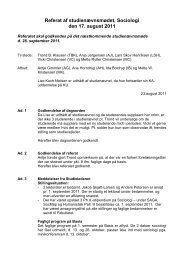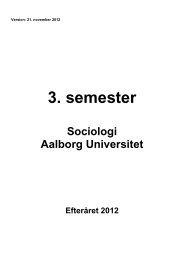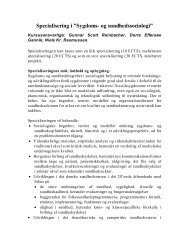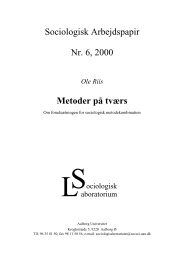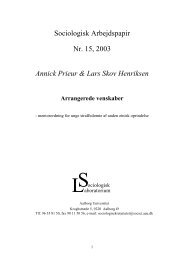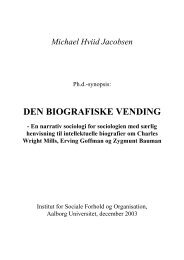Utopianism in the Work of Zygmunt Bauman - Sociologi - Aalborg ...
Utopianism in the Work of Zygmunt Bauman - Sociologi - Aalborg ...
Utopianism in the Work of Zygmunt Bauman - Sociologi - Aalborg ...
You also want an ePaper? Increase the reach of your titles
YUMPU automatically turns print PDFs into web optimized ePapers that Google loves.
words, that until <strong>the</strong> contrary is proved, reality <strong>of</strong> some attributes <strong>of</strong> <strong>the</strong> world and<br />
utopianism <strong>of</strong> <strong>the</strong>ir alternatives are both conditional on <strong>the</strong> cont<strong>in</strong>uation <strong>of</strong> some<br />
practices which, <strong>in</strong> pr<strong>in</strong>ciple, can be modified or altered (<strong>Bauman</strong> 1991b:280-<br />
281).<br />
This is <strong>in</strong>deed a very poignant summary <strong>of</strong> <strong>the</strong> critical core <strong>in</strong> his own work, a<br />
self-description <strong>of</strong> <strong>the</strong> qualities <strong>of</strong> critical social th<strong>in</strong>k<strong>in</strong>g that he wants to stress<br />
ei<strong>the</strong>r overtly or implicitly through his sociology. <strong>Bauman</strong>, though, is not a<br />
critical <strong>the</strong>orist per se – he <strong>in</strong>sistently refuses to wear <strong>the</strong> badge <strong>of</strong> allegiance <strong>of</strong><br />
whatever k<strong>in</strong>d or represent any traditions or schools <strong>of</strong> thought. Though, <strong>the</strong><br />
utopian and also adversarial element immanent <strong>in</strong> many parts <strong>of</strong> critical th<strong>in</strong>k-<br />
<strong>in</strong>g (Alexander 2001; Benhabib 1986; Calhoun 1995; Cohen & Arato 1992) is a<br />
key <strong>in</strong> understand<strong>in</strong>g <strong>the</strong> utopian strand that <strong>Bauman</strong> pursues throughout his<br />
many books whe<strong>the</strong>r he is writ<strong>in</strong>g on a critique <strong>of</strong> modernity, <strong>the</strong> characteristics<br />
<strong>of</strong> postmodernity or attempts to draw attention to <strong>the</strong> liquefied contours <strong>of</strong> con-<br />
temporary society. <strong>Bauman</strong>’s utopian journey, as <strong>the</strong> above by no means ex-<br />
haustive account has illustrated, consists <strong>of</strong> a mosaic <strong>of</strong> impressions, <strong>in</strong>spira-<br />
tions and changes. The utopian element derives as much vigour and <strong>in</strong>spiration<br />
from <strong>the</strong> ‘French connection’ constituted by Camus and his literary focus on <strong>the</strong><br />
ability <strong>of</strong> act<strong>in</strong>g o<strong>the</strong>rwise, Castoriadis and his political vision <strong>of</strong> <strong>the</strong> autono-<br />
mous society and <strong>in</strong>dividual equally a precondition for each o<strong>the</strong>r, and Lev<strong>in</strong>as<br />
and his appreciation <strong>of</strong> <strong>the</strong> moral responsibility developed through human prox-<br />
imity, as to some <strong>of</strong> <strong>the</strong> major ideas advanced by critical th<strong>in</strong>k<strong>in</strong>g or humanistic<br />
Marxism. They all share, <strong>in</strong> different guises and degrees, a concern with uto-<br />
pian ideals.<br />
Modernist Utopia as Predicament, Prediction and Postponement<br />
Utopia has always rema<strong>in</strong>ed <strong>the</strong> terra <strong>in</strong>cognita, <strong>the</strong> unknowable and <strong>in</strong>tangible<br />
that despite be<strong>in</strong>g mapped and meticulously described <strong>in</strong> many a book still<br />
18



